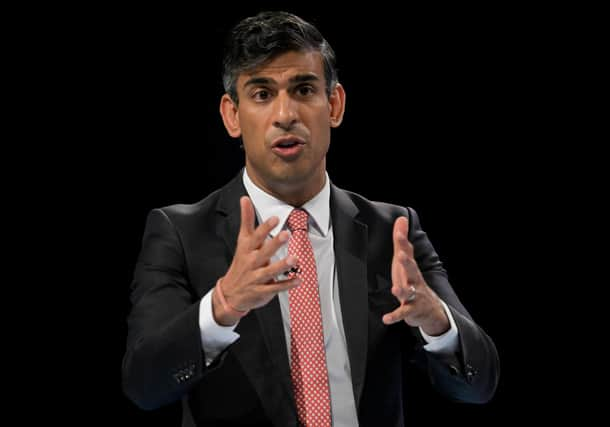Owen Polley: It’s farcical to ask unionists to welcome being edged out of UK


I wrote a column (‘Unionists should stand firm if protocol deal not right,’ February 27 – see link below) in which I argued that unionists should oppose an agreement if the details weren't right, even if that risked making themselves unpopular again.
When the Windsor Framework was eventually announced, the government claimed that it restored our place in the British internal market and removed ‘any sense of a border’ in the Irish Sea. That sounded positive, but, perhaps predictably, it soon became clear these claims had been exaggerated.
Advertisement
Hide AdAdvertisement
Hide AdThe DUP subsequently voted against the ‘Stormont Brake’ element of the deal, which was the only part that Rishi Sunak put to a parliamentary vote. Sir Jeffrey Donaldson told a group of eurosceptic Tory MPs that the framework offered no basis to return to power-sharing at Stormont at that time.
Dame Arlene Foster recently argued in the Daily Telegraph that the party had not in fact rejected the deal in its entirety, but the DUP has been increasingly scathing about the government’s plans. It seems to have joined Jim Allister’s TUV as opponents, at least for the time being.
In contrast, the Ulster Unionists, while they expressed reservations about the framework, talked up its economic potential. The party’s reaction has been relatively positive. Doug Beattie spoke about changing the sea border in the future, but, effectively, the UUP accepted the deal.
There are all kinds of valid arguments about how unionism should respond to the framework, that address our lack of options and the potential consequences of boycotting the Stormont institutions. The idea that it can be portrayed as partly positive for Northern Ireland’s place in the UK is considerably shakier.
Advertisement
Hide AdAdvertisement
Hide AdThe University of Ulster’s senior economist, Dr Esmond Birnie, published a typically methodical analysis of the framework’s likely effects on Northern Ireland’s economy last week (‘Framework is bad for both the economy and accountable government,’ March 31). It pointed out that, even if we accepted the apparent ‘benefits’ of the deal as advertised, the new ‘green lane’ explicitly excludes most manufacturers.
According to Dr Birnie, the framework is likely to accelerate, “a shift from relatively high productivity sectors to relatively low productivity ones. The economy will be shifted backwards”.
Some manufacturers have already expressed doubts about whether the reformed trading arrangements will help them. Likewise, representatives from haulage, fisheries, horticulture, and even the influential The Grocer magazine, which serves food retailers, have all questioned the government’s claims that the framework will benefit their industries.
These suspicions are about the practical aspects of the deal, which the negotiators assured us were their primary focus. That’s before we start on the very clear constitutional implications that concern most unionists, who are supposed to want to play a full and ever increasing role in the economic, political and cultural life of the UK.
Advertisement
Hide AdAdvertisement
Hide AdIf you think back to the aftermath of the Brexit referendum in 2016, the most optimistic and aggressive nationalists started to demand, very quickly, that Northern Ireland should be granted ‘special status’, that would keep it within the European Union while Great Britain left. The government, unionists and many neutrals wrote these calls off immediately as unachievable and damaging to the integrity of the UK.
Almost unbelievably, Rishi Sunak is now the third Conservative prime minister, at the last count, to agree a form of special status with the EU. Theresa May’s ‘backstop’, Boris Johnson’s ‘protocol’ and now Sunak’s framework all delivered, essentially, everything that the most uncompromising nationalists demanded from Brexit negotiations.
At least May saw her deal as an ‘insurance policy’ and intended to keep the whole UK within Brussels’ orbit. Even Boris Johnson seemed to think he could negotiate back from the protocol, as it was drafted, either by exempting certain industries, ignoring aspects of the agreement or legislating at Westminster.
By his own admission, the current prime minister intends the framework to be final. That almost certainly means Northern Ireland becoming ever more different to the rest of the UK, supply chains shifting steadily to the Republic or further afield and the political, social and cultural landscape of our province following suit.
Advertisement
Hide AdAdvertisement
Hide AdAlready, while our own government refuses to answer questions, the European Union is setting out how the green lane will require companies to navigate a full slate of documents and checks. Brussels remains legally in charge of huge swathes of life here and the few concessions the UK clawed back have turned out to be limited, bound by numerous conditions and potentially temporary.
Northern Ireland is now a political and economic hybrid – officially British, but largely under the authority of the European Union. There was no open or honest debate about this change in status, but the supposedly unionist Conservative government was so eager to secure Brexit for the rest of the UK, that it repeatedly decided to leave Northern Ireland behind.
Now, unionists can expect to be demonised and abused if they refuse to accept their new, reduced position in the United Kingdom. Indeed, in a farce, they are being urged to welcome the fact that, unless something radical changes, they are set to be edged ever further from the mainstream of British life.
We can have a discussion about how best to respond to this, whether our political position is recoverable and how best to minimise the damage to what remains of the Union. But to claim that the problems with the protocol have been largely solved, or to reheat the ‘best of both worlds’ con trick, simply insults people’s intelligence.